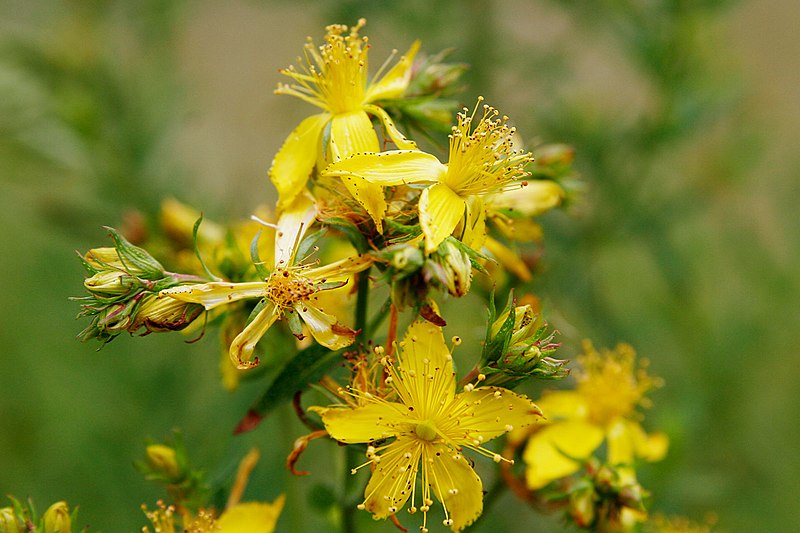St. John’s Wort
 Photo courtesy of WikipediaOpens in new window
Photo courtesy of WikipediaOpens in new window
|
St. John’s wort (Hypericum perforatum) is an herbal product marketed as a dietary supplement. It is frequently used as a treatment for depression; it has also been used to treat nerve pain, anxiety, sleep disorders, malaria, insect bites, wounds, and burns.
St. John’s wort is also known as amber touch-and-heal, balm-of-warrior’s wound, balsana, bassant, Blutkraut, corancillo dendlu, devil’s scourge, Eisenblut, flor de Sao Joa, fuga daemonum, goatweed hartheu, heofarigo on herba de millepertius, herba hyperici, herrgottsblut, hexenkraut, hierba de San Juan, hipericao, hiperico hipericon, isorhamnetin, Jarsin, Johanniskraut, klammath weed, liebeskraut, millepertius pelicao, perforate, pinillo de oro, pseudohypericin, rosin rose, tenturotou, Teufelsflucht, touch and heal Walpurgiskraut, and witcher’s herb.
A study with 340 participants found that St. John’s wort was not more effective than a placebo (sugar pill) in the treatment of major depression of moderate severity (Hypericum Depression Trial Study Group, 2002). However, an evidence-based monograph from the Natural Standard Research Collaboration (2009) claims that scientific evidence supports the effectiveness of St. John’s wort to treat mild to moderate depression.
Research does not support the effectiveness of St. John’s wort as a treatment for severe depression, seasonal affective disorder, anxiety, obsessive-compulsive disorder, premenstrual syndrome, menopause symptoms, social phobia, or HIV.
Common side effects of St. John’s wort include dry mouth, dizziness, gastrointestinal symptoms, increased sensitivity to sunlight, fatigue, sexual dysfunction, swelling, and urinary frequency.
There are reports of St. John’s wort causing suicidal or homicidal thoughts. Use of St. John’s wort may reduce the effectiveness of certain other drugs, including indivir (a protease inhibitor used to treat HIV), cyclosporine, birth control pills, and medications for heart disease and depression.
Combining St. John’s wort with other selective serotonin reuptake inhibitor (SSRI) antidepressants can be dangerous, causing serotonin syndrome or precipitating mania. Serotonin syndrome is characterized by muscle rigidity, fever, confusion, increased blood pressure and heart rate, and coma (Henney, 2000).
See also:
- Brennan, C. (2000, January 2). St. John’s wort—A natural remedy for depression?
- National Center for Complementary and Alternative Medicine. (2002). Study shows St. John’s wort (Hypericum perforatum) and the treatment of depression (NIH NCCAM Publication No. D005).
- Henney, J.E. (2000). Risk of drug interactions with St. John’s wort. Journal of the American Medical Association, 283, 1679.
- Hypericum Depression Trial Study Group. (2002). Effect of Hypericum perforatum (St. John’s wort) in major depressive disorder: A randomized controlled trial. Journal of the American Medical Association, 287, 1807 – 1814.

